 Petzlover
Petzlover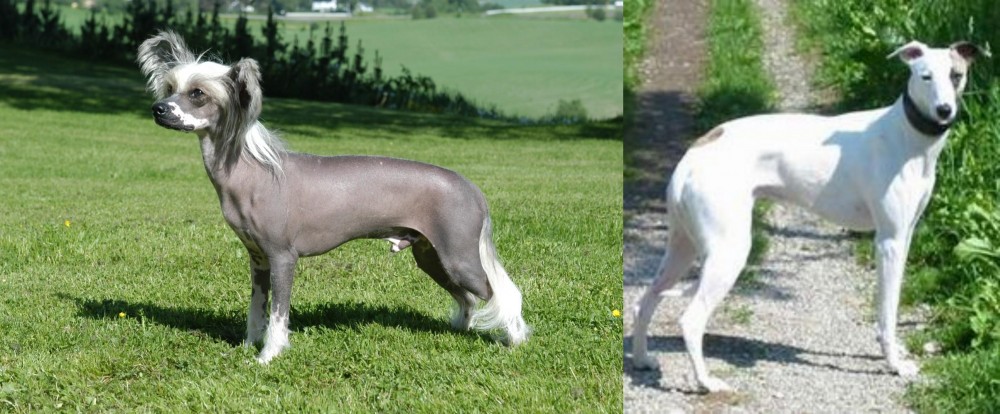 Chinese Crested Dog is originated from Mexico but Kaikadi is originated from India. Chinese Crested Dog may grow 15 cm / 5 inches shorter than Kaikadi. Chinese Crested Dog may weigh 16 kg / 35 pounds lesser than Kaikadi. Both Chinese Crested Dog and Kaikadi has same life span. Chinese Crested Dog may have less litter size than Kaikadi. Both Chinese Crested Dog and Kaikadi requires Low Maintenance.
Chinese Crested Dog is originated from Mexico but Kaikadi is originated from India. Chinese Crested Dog may grow 15 cm / 5 inches shorter than Kaikadi. Chinese Crested Dog may weigh 16 kg / 35 pounds lesser than Kaikadi. Both Chinese Crested Dog and Kaikadi has same life span. Chinese Crested Dog may have less litter size than Kaikadi. Both Chinese Crested Dog and Kaikadi requires Low Maintenance.
 The Chinese Crested Dog is believed to have its origins in Africa and there are many texts from the 19th Century that feature an Africa Hairless Terrier that resembles the Chinese Crested. However, the scientific and genetic evidence leads to an origin that is shared with the Mexican Hairless Dog. Any way you look at it the dog did not originate in China. The Chinese were very fond of this breed and used them on their ships to control the rat populations. This is probably how they got their name.
The Chinese Crested Dog is believed to have its origins in Africa and there are many texts from the 19th Century that feature an Africa Hairless Terrier that resembles the Chinese Crested. However, the scientific and genetic evidence leads to an origin that is shared with the Mexican Hairless Dog. Any way you look at it the dog did not originate in China. The Chinese were very fond of this breed and used them on their ships to control the rat populations. This is probably how they got their name.
There are two types of Chinese Crested Dogs – the well known Hairless, and the lesser known Powderpuff. The Hairless type is better known because they carry the dominant trait and the Powderpuff is recessive. However, this recessive gene is carried by every Chinese Crested Dog so the Powderpuff can show up in all litters even those of two Hairless Crested. Two Powderpuffs will not result in any Hairless in their litters as the Powderpuff does not have the gene for the Hairless.
The “Crest Haven” Kennel was opened by Debora Wood in the 1950’s to breed the Chines Crested Dog. At the same time Gypsy Rose Lee, of the famous burlesque shows, was also breeding Chinese Crested Dogs. The two lines of Crested bred by Americans came together following the death of Rose Lee. Every Chinese Crested that lives today can trace their heritage directly to these two breeding lines. In 1959, Debra Wood founded the American Hairless Dog Club which became a part of the American Chinese Crested Club or the ACCC in 1978. This organization then became the breed’s parent club after AKC (American Kennel Club) recognized the breed in 1991. Prior to this the Federation Cynologique Internationale, recognized the breed in 1987, the United Kingdom (UK)the Kennel Club recognized them in 1981 and the Australian National Kennel Council recognized the Crested in 1995.
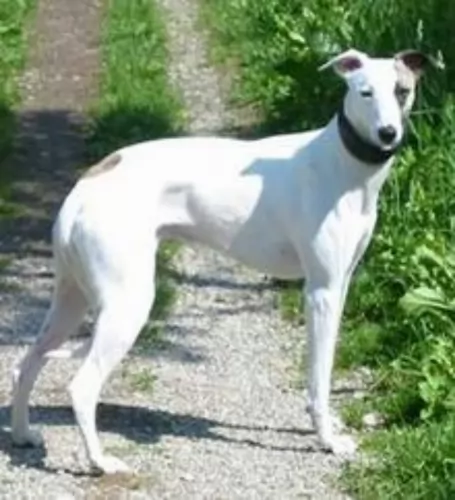 The Kaikadi or Kai Kadi is a terrier dog, hailing from India. Not much is available on the history of the dog, but today you won't easily find original Kai Kadi in India. This is because they have essentially been mixed with stray dogs of India as well as Pariah.
The Kaikadi or Kai Kadi is a terrier dog, hailing from India. Not much is available on the history of the dog, but today you won't easily find original Kai Kadi in India. This is because they have essentially been mixed with stray dogs of India as well as Pariah.
It is for this reason that the dog isn't recognized as a standardized breed by any of the leading kennel clubs.
 This is a toy breed and very small. The Hairless and the Powderpuff are two types of the same breed, although they do not look like it. The Hairless type can have fur anywhere on its body, but it will not have much. It will have hair on its paws, tail and head. The Powderpuff on the other hand will have a thick double coat. When discussing the color of the hairless, one is referring to the color of its skin. It can range from flesh to black.
This is a toy breed and very small. The Hairless and the Powderpuff are two types of the same breed, although they do not look like it. The Hairless type can have fur anywhere on its body, but it will not have much. It will have hair on its paws, tail and head. The Powderpuff on the other hand will have a thick double coat. When discussing the color of the hairless, one is referring to the color of its skin. It can range from flesh to black.
The Powderpuff has a soft, thick, straight double coat. It can have very long hair. The Hairless must have its skin taken care of and protected. Both types of Chines Crested are small in stature with well proportioned, athletic bodies.
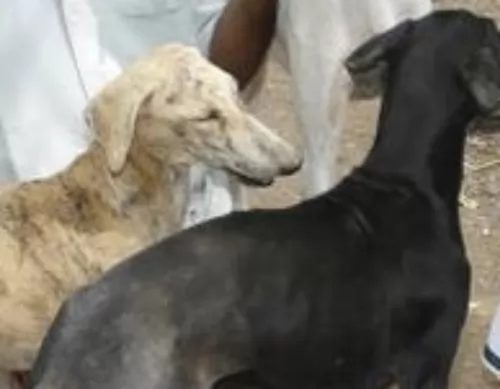 These dog have always been used for hunting, guarding and herding in India and today he makes a good watchdog, watching over his human family.
These dog have always been used for hunting, guarding and herding in India and today he makes a good watchdog, watching over his human family.
It's not a large dog though and he stands at roughly 35 to 45cm in height and weighs 17 to 21kg. He is lean and muscular, looking similar to the Italian Greyhound or Whippet.
He has a short smooth coat and the color can be patterned white, tan and black. The head is long and thin, as are the legs, and his tail is long and thin too. The floppy ears stand erect when alert.
The Kaikadi is an affectionate, alert, energetic dog. He won't do well in a city environment with a tiny garden as he requires a large garden to run in.
He is a dog that will need to be trained and socialized if you want him to be obedient and to get on well with children in the home as well as pets.
He can be a fairly quiet, docile dog inside but outside when there is a game to be had, he becomes lively and animated. They are quite sensitive, so while they get on well with children in the home, he won’t respond well to large families with lots of rowdy, undisciplined children as it makes him anxious.
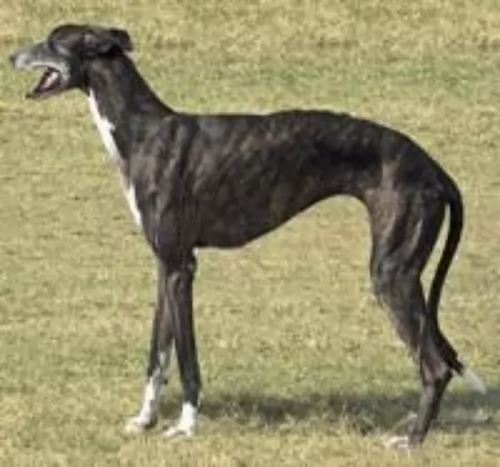 Your Kai Kadi loves running and playing outside, after all he has always been a hunting dog. He will love to spend time with you outside playing.
Your Kai Kadi loves running and playing outside, after all he has always been a hunting dog. He will love to spend time with you outside playing.
The Kaikadi is a low maintenance dog too. Provide your Kaikadi with everything that makes a dog happy and in exchange you’ll get yourself a loyal, loving pet who wants to be your friend.
 The Chinese Crested Hairless version must have its skin take care of much in the same way we take care of our own. It will burn if exposed to too much sun without protection. They can suffer from dry skin, acne, need moisturizing cremes. They get skin allergies as well and it is important to take care of the skin instead of the brushing you don’t have to do.
The Chinese Crested Hairless version must have its skin take care of much in the same way we take care of our own. It will burn if exposed to too much sun without protection. They can suffer from dry skin, acne, need moisturizing cremes. They get skin allergies as well and it is important to take care of the skin instead of the brushing you don’t have to do.
The Chinese Crested does not suffer from most of the diseases other toy breeds do. They can have ye issues. The Hairless have a “primitive mouth” . They have pointy teeth and poor dentition. This is not true of the Powderpuffs however. Their eye issues include:
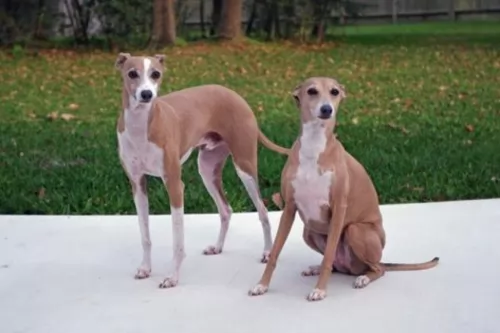 When you’ve got a Kai Kadi, make sure you understand some of the health risks that come along. This is a healthy dog breed so you’re not likely to have much going wrong with him, but you need to know that he can get sick and then you need to have the name of a good vet for medical treatment -
When you’ve got a Kai Kadi, make sure you understand some of the health risks that come along. This is a healthy dog breed so you’re not likely to have much going wrong with him, but you need to know that he can get sick and then you need to have the name of a good vet for medical treatment -
A sudden drop in blood sugar, which is many times brought on by stress, can make your dog lethargic and even have slight tremors in the face. It could be a hypoglycemic attack. See the vet immediately.
The pancreatitis can become inflamed and your dog could be vomiting, have diarrhea and have abdominal pain. There are quite a few things that can cause pancreatitis such as obesity, infection as well as stress.
 Like several other toy breeds, it is easy to overfeed the Chinese Crested because it has such a small stature. Feed once or twice a day but never more than one fourth of a cup total for the day.
Like several other toy breeds, it is easy to overfeed the Chinese Crested because it has such a small stature. Feed once or twice a day but never more than one fourth of a cup total for the day.
Luxating Patellas – kneecaps move out of place and cause lameness and arthritis
Legg-Perthes Disease – a hip disorder where blood does not reach the head of the femur. The bone dies, and growth stops.
Canine Multiple System Degeneration (CMSD) – a progressive movement disorder can call falls
This Breed does not need an excessive amount of exercise, but they do enjoy running. They are competitive and athletic, so they can excel at flyball, lure coursing, agility and obedience. They are sensitive and trainable enough to become a therapy dog.
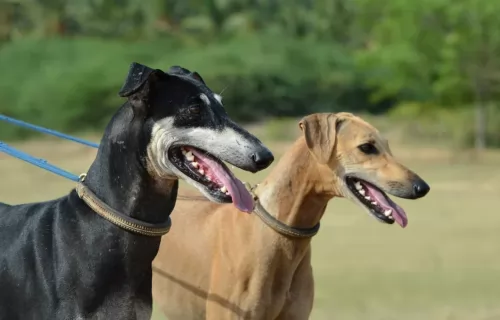 Owning a dog is a responsibility, requiring you to look after a living being just like you would any family member of yours, otherwise why get a dog in the first place?
Owning a dog is a responsibility, requiring you to look after a living being just like you would any family member of yours, otherwise why get a dog in the first place?
You may want a dog for watchdog purposes, but as a living creature, it is important to develop a relationship with your pet and to show him that you love and appreciate him.
There are many things to do to ensure you have a healthy, happy 4-legged canine member in your household
Make sure he has fresh, cool water available to him around the clock.
Provide him with a warm, dry place to sleep.
Provide him with wholesome food to maintain health. There are many excellent commercially manufactured foods on the market. Buy one according to the size and energy levels of your pet. Try to sometimes add cooked home-made food into his kibble such as cooked chicken, brown rice and vegetables as well as some raw meat from time to time. This diet is guaranteed to keep your pet mentally and physically well.
Check your pets nails, ears and eyes regularly. He should be checked for fleas and ticks when you brush him twice a week. Have him examined by a veterinarian as soon as you suspect something is amiss with him. Keep him up to date with his vaccinations.
The Kaikadi is an energetic dog so make sure that you provide him with the opportunity to be exercised. Take him on walks or hikes, play ball and rope games with him and go swimming with him to ensure he remains lean and muscular.
Have him trained and socialized as it takes off the rough-edges of a dog.